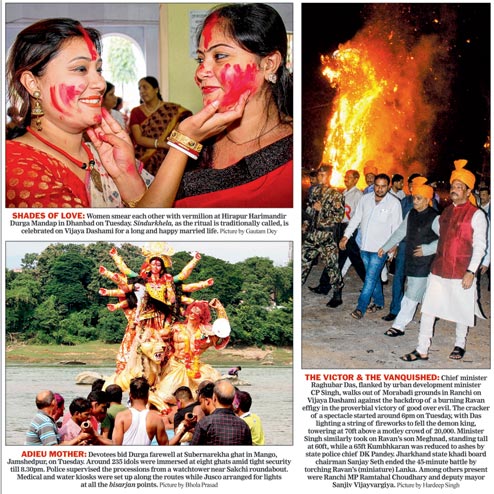Fun with friends should be - well - just fun. But, fun has become almost synonymous with fatal in Jharkhand, especially when it means making a splash at the state's many picturesque waterfalls, rivers and reservoirs.
Three teenagers from Ranchi and Jamshedpur, all school students and none of them knowing how to swim, drowned in the past three weeks at Hundru Falls and River Subernarekha arguably because they ignored warnings. Mental health specialists say the schoolboys were merely engaging in a behaviour widely practised by adolescents worldwide - taking risks in the company of peers.
Research studies have established that exploratory behaviour appears to peak during adolescence and teenagers are more likely to take risks in the presence of friends who they try to impress. For instance, a teenager is more likely to drive rashly or indulge in binge drinking when in a group than when alone.
On June 28, Noor Alam (16) - a tenth grader of Greenland Public School in Hesag, Ranchi - had bunked classes to have fun with a group of 10 friends at the waterfalls, 42km from the capital. He had twice ignored warnings of tourist guards who said it was unsafe to go into the waters in monsoon. He drowned.
On July 3, Anshik Banerjee (17) - a Class XI student of DBMS English School in Kadma, Jamshedpur - and his friend Rajat Kamal (18), a twelfth grader from another school, were swept away by the water current in Subernarekha in Chandil, where a group of five friends had gone on a day trip.
"Two factors largely influence such behaviour," said Ram Chand Jiloha, professor of psychiatry at Maulana Azad Medical College, New Delhi, and president of the Indian Association of Child and Adolescent Mental Health. "First, adolescence appears associated with a tendency to be adventurous even if it means disobeying instructions; second, adolescents want to belong to their group of peers, they don't want to feel isolated in any way. So, when peer pressure is intense, they yield."
A landmark study by neuroscientists at the University College, London, had found seven years ago that while teenagers are good at weighing the pros and cons of their decisions, they take risks because they enjoy the thrill of the risky situation more than children or adults.
In 2011, psychologists at Temple University in the US had observed, during experiments involving simulated driving, that while adolescents and adults showed similar driving behaviour while alone, the former took greater risks when they knew their friends were watching.
But, while such adolescent behaviour is universal, some psychologists say cultural influences may also shape conduct in some societies. This may explain why multiple warnings and advisories issued by the Jharkhand tourism department fails to prevent adolescents from venturing into troubled waters.
"In a culture where people disobey rules or where people like to portray themselves as being able to get away with violation of rules, such as jumping traffic lights, even adults tend to disregard warnings," said Savita Malhotra, former head of psychiatry at the Postgraduate Institute of Medical Education and Research, Chandigarh.
Clinical psychologists in Ranchi squarely blamed two factors for the untimely deaths - one, the tendency of adolescents to imitate peers; two, inability of many parents to communicate with their children.
"Parents must instil confidence in their children," said S.D. Pahan, a clinical psychologist at Central Institute of Psychiatry, Kanke.
Dr Siddharth Sinha of Ranchi Institute of Neuro-Psychiatry and Allied Sciences (RINPAS) too agreed. "Working or not, parents tend to be busy and offer inadequate attention to children. When an adolescent cannot vent within the family, he or she will try to vent amongst peers, and often with terrible results," Sinha said.
Some schools are doing their bit too to help students channel their energy in a positive way.
Teachers of Motilal Nehru Public School in Sakchi, Jamshedpur, make it a point to interact with students at an emotional level. "Conflicts of the mind are assessed and overcome at a special activity class every day. We try to make students feel at home - wanted and understood," summed up principal Ashu Tiwary.
ADDITIONAL REPORTING BY KUMUD JENAMANI & ANTARA BOSE











